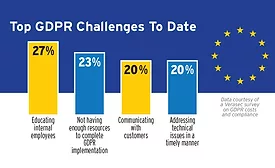Home » security compliance
Articles Tagged with ''security compliance''
GDPR Implementation Costs Enterprises More than Expected
Only 29% of healthcare organizations report having a comprehensive security program in place.
December 1, 2018
Clear, Purge & Destroy: When Data Must be Eliminated, Part 2
Part 2 of a 2-part series on information disposal requirements
November 1, 2018
Clear, Purge & Destroy: When Data Must be Eliminated
Part 1 of a 2-part series on information disposal requirements
October 1, 2018
How to Manage Lone Worker Safety in a Dynamic World
Employees who are out of sight cannot be out of mind
September 25, 2018
The GDPR and Privacy: What Security Leaders Need to Know
If You Think the GDPR Doesn’t Affect You, Think Again
September 24, 2018
Sign-up to receive top management & result-driven techniques in the industry.
Join over 20,000+ industry leaders who receive our premium content.
SIGN UP TODAY!Copyright ©2026. All Rights Reserved BNP Media.
Design, CMS, Hosting & Web Development :: ePublishing








